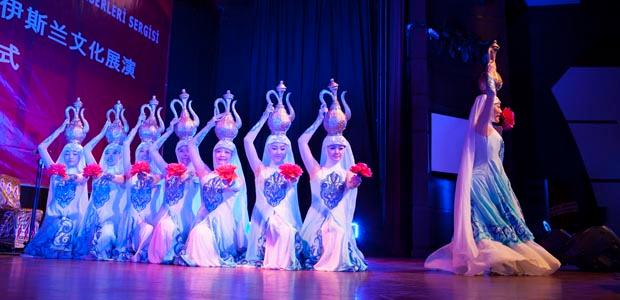China holds exhibition to ease Turkish concerns over treatment of ethnic Uygurs
Chinese dancers perform at the Fatih Ali Emiri Kitr Merkezi in Istanbul, Turkey, on Aug. 31, 2012. (Photo by Agata Skowronek.)
China’s government is hoping to soothe Turks’ concerns about the ill treatment of that country’s 23 million Muslims — which include a fairly substantial population of Turkic Uygurs.
The Chinese have funded an exhibition in Istanbul that amplifies the positives with Chinese Muslims’ relationship with the central government. Muslims in China make up less than 2 percent of the population.
Zhang Jian from the Chinese state religious body, says the Istanbul exhibition is meant to inform international audiences about the richness of Islamic culture in China.
“To know more about how Chinese Muslims live their lives in China and how they live their religious life,” Jian said.
See more photos from the Chinese exhibit, visit TheWorld.org.
There’s a lot of rumors he says, that the Chinese government prevents Muslim men from wearing beards for example, or that it stops women from covering their heads.
It’s not true, he says. Muslims live freely in China and the exhibits are proof of this reality.
“The reasons we hold such kind of activities, is to know what really happens in China,” he said.
The exhibition features traditional songs and dances by two Muslim performing groups. The Uygur dancers are dressed in intensely colorful costumes as they perform tightly choreographed songs and dances. But unlike the music, and the rosy picture painted by the government official, life for Uygurs in China isn’t especially joyful.
“I don’t want to speak Chinese,” said a Uygur émigré at the performance. She didn’t want to reveal her name, fearing reprisals against her family in Xinjiang.
She says the Chinese government is trying to wipe out the Uygur language.
“I’m afraid for the future. I fear for the Uygur language that everyone will forget it. Everywhere it’s only Chinese,” she said.
The woman says the Chinese government is trying to assimilate Uygurs by force, eliminating Uygur-language education and giving economic opportunities only to the majority ethnic Han Chinese.
Human Rights Watch concurs. A recent report said, “under the guise of counterterrorism and anti-separatism efforts, the government maintains a pervasive system of ethnic discrimination against Uyghurs and other ethnic minorities.”
Perhaps more than anywhere else in the world, in Turkey, the people and government are sensitive to Uygur pleas. Hugh Pope, a Turkey analyst and author of “Sons of the Conquerors: The Rise of the Turkic World,” said Turkish school children are taught that China’s Uyguys are their brothers.
“Eight million people who are under Chinese sovereignty in Xinjiang, or as it used to be known East Turkestan, because it’s the eastern bit of where Turks still live in Central Asia,” he said, “(are) still in the Turkish consciousness as being a Turkic people, blood brothers according to the state ideology of the Turkish Republic.”
China hopes that cultural exchanges like this one will help ease Turks’ reservations about Muslims in China. But Pope says public relations are probably not even needed. China’s economic power will always move Turkey more than the human rights of their Uygur brothers.
“Most people are interested in buying Chinese products, Turkish companies are building things in Chinese cities just like everyone else in the world,” Pope said. “We are seeing the beginning of a military relationship. Turkish leaders do go and visit Xinjian and wear Uygur dress. And China is happy with that because it shows that everything is all right.”
Turkey is a rising regional power but it’s still a medium-sized, developing country. Its not in Turkey’s interest to have trouble with China, Pope said.
What’s more, most of the Uygurs’ ancient cities have already been razed, to make way for new cities likely to be dominated by majority ethnic Han Chinese.
